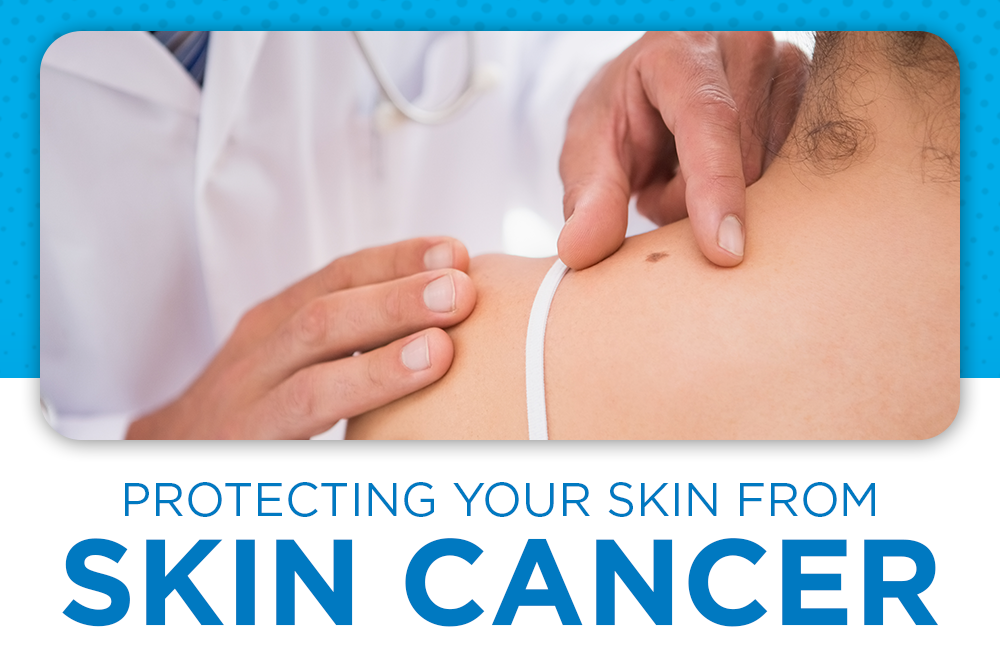With summer in full swing, it’s time to soak up those rays and enjoy the great outdoors. Before you grab your beach towel and sunscreen, let’s talk about the importance of protecting your skin from harmful UV rays. Skin cancer is a serious issue that affects millions of people worldwide, so it’s crucial to arm ourselves with knowledge and take proactive steps to keep our skin safe.
Types of Skin Cancer
Skin cancer is the result of damage to the top layer of the skin, which results in mutations of the skin cells. These mutations can form dangerous tumors and present as cancer. The main types are:
- Basal Cell Carcinoma (BCC)
- Squamous Cell Carcinoma (SCC)
- Melanoma
- Merkel Cell Carcinogen (MCC)
Basal Cell and Squamous Cell carcinomas are the two most common types that often present as growths on the skin. The two main causes of skin cancer are the sun’s harmful ultraviolet (UV) rays and using UV tanning beds.
Wear Sunscreen Year-Round
Sunscreen should be worn year-round, not just during the summer months. Many people mistakenly believe that sunscreen is only necessary during hot weather or when spending extended periods of time in the sun. However, UV rays can still damage the skin even on overcast or cloudy days, making sunscreen a crucial part of the daily skincare routine. When it comes to skin cancer prevention, wearing sunscreen is one of the most effective measures we can take.
Reduce Exposure to UV Rays
It is important to protect your skin from harmful UV rays to reduce the risk of developing skin cancer. One way to do this is by staying indoors or seeking shade during the peak hours of sunlight, typically between 10 am and 4 pm. Additionally, wearing protective clothing such as hats, long-sleeved shirts, and sunglasses can also help shield your skin from the damaging effects of the sun.
Keep an Eye Out for Warning Signs
Regularly checking your skin for any changes or abnormalities is crucial in detecting skin cancer early. It is important to look over your body for new moles or growths. Also look for any changes in existing moles (such as size, shape, or color), or any sores that do not heal. By being attentive and proactive in monitoring your skin, you increase the chances of catching any potential signs of skin cancer before they develop further.
Ask Your Doctor for Advice
It is important to ask your doctor for advice about skin cancer prevention, as they can provide personalized recommendations based on your individual risk factors and medical history. By working closely with your doctor and following their guidance, you can actively participate in preventing skin cancer and maintaining your well-being.
If you have concerns about developing skin cancer, or any form of cancer, visit our Cancer Care page to see your next steps and schedule an appointment with our cancer care physicians. Our Cancer Care page will also take you to the Cancer Centers of Southwest Oklahoma website, providing more information about potential free cancer screenings.
Resources:
https://www.skincancer.org/skin-cancer-information/
https://www.skincancer.org/skin-cancer-prevention/sun-protection/
https://www.skincancer.org/early-detection/self-exams/
Disclaimer
The Comanche County Memorial Hospital website does not provide specific medical advice for individual cases. Comanche County Memorial Hospital does not endorse any medical or professional services obtained through information provided on this site, articles on the site or any links on this site.
Use of the information obtained by the Comanche County Memorial Hospital website does not replace medical advice given by a qualified medical provider to meet the medical needs of our readers or others.
While content is frequently updated, medical information changes quickly. Information may be out of date, and/or contain inaccuracies or typographical errors. For questions or concerns, please contact us at contact@ccmhhealth.com.

